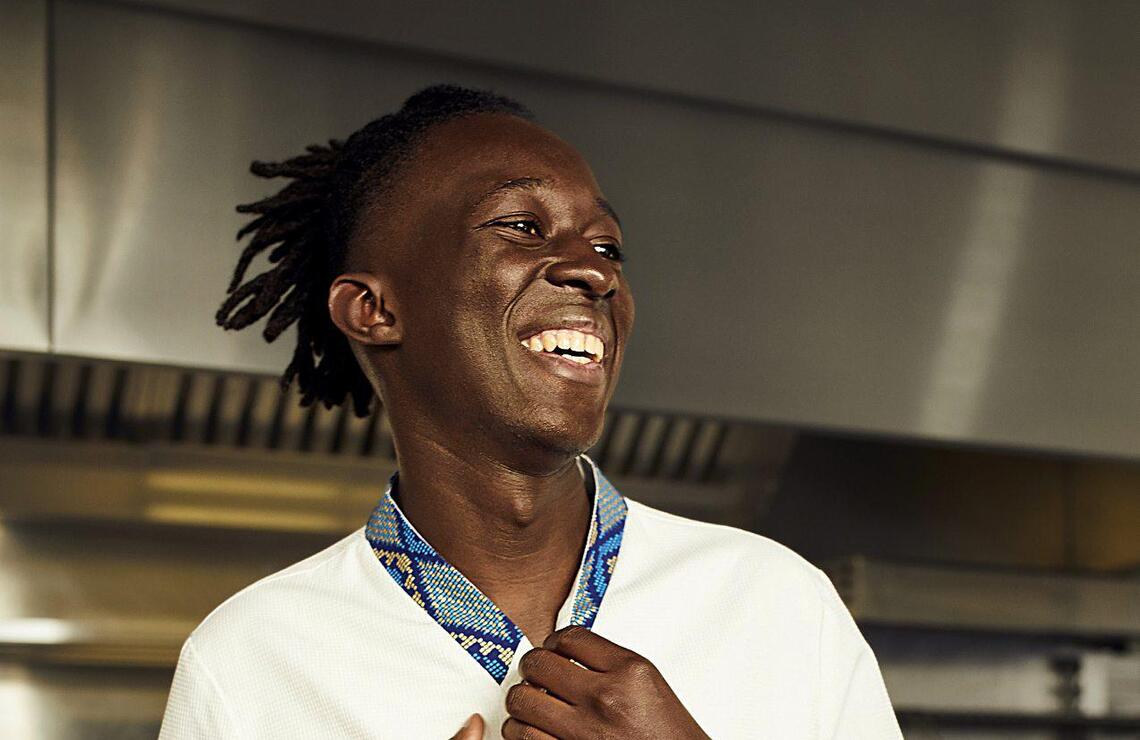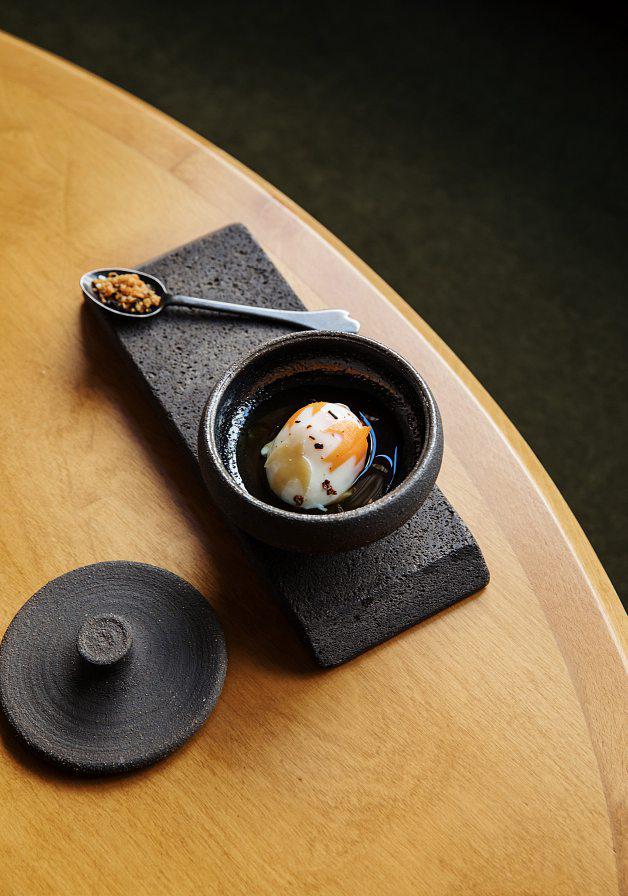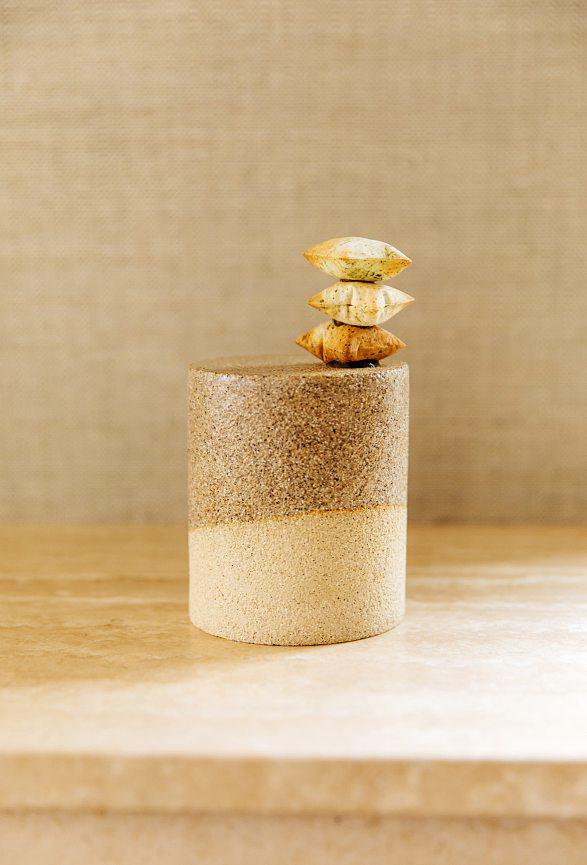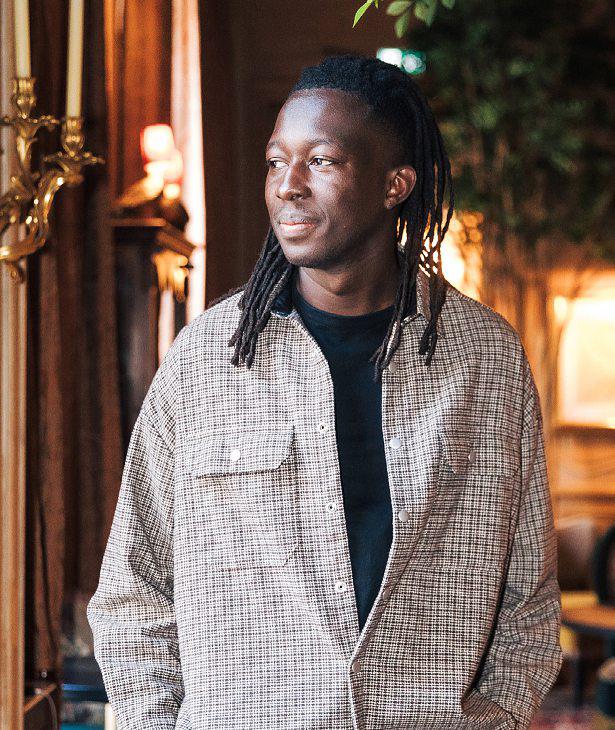
Mory Sacko
The global African chef
He describes himself as a Frenchman of West African descent and he's imposed his style on the culinary scene in Paris, the world's most demanding gastronomic capital. Interview with a Michelin-star chef of boundless creativity, who has made multiculturalism and fusion his trademarks.

His warm smile, imposing stature and gentle, sparkling gaze have made him a television personality loved by millions of French people, after his first appearance on Top Chef in 2020. Mory Sacko, the sixth of nine siblings from a family of Senegalese-Malian descent, has made a name for himself on the small screen, but he also has a solid background in prestigious Parisian hotels. He worked in the kitchens of the Royal Monceau and the Shangri-La, before arriving at the Mandarin Oriental, where he worked closely with Thierry Marx and quickly became his sous-chef. Even though he didn't win the TV competition, he went on to open his own gourmet restaurant, MoSuke a combination of his first name and that of an African slave who became a samurai where he offers creative cuisine that combines Asian, French and African influences. Three months after opening, he was awarded his first Michelin star and today, aged just 31, he is one of the symbols of the new generation of ‘Afro-French’ chefs.
AM: Firstly, do you identify with the term ‘Afro-French'?
Mory Sacko: I define myself as a Frenchman of West African descent, but 'Afro-French' is fine too. I'm French because France is where I was born and raised. But I also have origins that I like to celebrate, and claim when necessary. I'm French as much as any other French person, but with all the influences and culture that my parents brought to me, which will always be a plus for me. I think that anyone who has origins and is proud of them feels the same way.
This pride is evident, right down to your now iconic chef's jacket, which I believe you designed yourself.
Yes, that's right. In a way, I wanted to transfer the imagination present in my kitchen to my workwear. The idea was to combine strong markers, like the white coat that we naturally associate with chefs and which was originally created in France, with a kimono cut that takes us back to Japan and a little wax border on the collar and cuffs that evokes West Africa. I personally chose the wax patterns and colours that appealed to me most.
We were originally going to do this interview at MoSuke, but we ended up seated in your magnificent new restaurant, Lafayette's, in a former private mansion just a stone's throw from the Élysée Palace. Not quite the same style...
Indeed, the contrast is quite stark. At MoSuke, we're going for something natural, very small, and very intimate. Even the crockery has vegetal and mineral overtones, like stoneware and wood. I wanted a very French, historical setting for Lafayette's, with tapestries, mouldings, painted ceilings and creaky parquet floors. And we ticked all the boxes! Architect Lázaro Rosa-Violán did a brilliant job on the design. The idea from the start was to have porcelain crockery, tablecloths, chandeliers, candles... I dreamt of serving my food, which is French but also African, in a place like this. And I thought it was funny and fantastic that customers could eat mafé and ribeye steak béarnaise at the same time.
In just a few years, you've become a star of the gastronomic world and not only in France. You even made the cover of Time magazine as one of its 2023 TIME100 Next rising stars. Were you surprised? What impact has it had on your work?
It was a real surprise! I'd been notified that I was on the list, but a few weeks before the magazine came out, I was chosen to be on the front cover for my region. Shortly afterwards we did the photoshoot. Personally, I was very happy and, professionally, it was a nice change. This front cover marked a turning point for me in terms of my status, my personality, in relation to other people. That's when I felt the power of this type of media, the power they have to choose personalities to elevate. It was a really positive experience for me.
You were recently invited to be a guest judge on the MasterChef Italy reality TV show, where you suggested a kitchen personality test. We get the impression that you feel quite strongly about this subject and that, through all the restaurants you've opened over the last four years, you're in some way expressing several facets of your personality.
I see each recipe as a wonderful way of sharing my view of the world and my personal story, but also what I feel like communicating at that particular moment. Over the last few years, I've opened a lot of new restaurants, and that means a lot of parallel stories. MoSuke is a gourmet restaurant, and it's the place where I can push my ideas and explore my personality in the kitchen. In MoSugo, we do street food and we only offer things that I like eating, like fried chicken or burgers. There was Edo [a pop-up restaurant in Paris, then Lyon and Marseille], where we also served street food, but for 500 diners a day. We had to think about creating dishes that were generous and tasty, but also memorable. At Vuitton, in Saint-Tropez, on the other hand, we designed a very conceptual brasserie menu, with ekiben boxes, prepared down to the smallest detail. And now there's Lafayette's. The cuisine is still mine, but the challenges and dishes are different. I love this variety, because each time I'm forced to challenge my limits and ask myself what direction to take. Can I come up with even more recipes and concepts? For the moment, I've got the energy to do it, so I'll keep going.
How do you manage all these projects? Time magazine wrote that you're building an empire, but being a chef and an entrepreneur isn't easy!

I don't have an empire yet! [laughs] Seriously though, you have to know how to recruit the right people and remember that you can't be everywhere. For example, I decided to work at MoSuke for lunch and dinner. In the other restaurants, I put in the time to work with chefs between two courses or at weekends. I'm still very much involved in the creative side of things I did all the creative work at MoSugo and Lafayette's - but I've also been able to hand over the operational and day-to-day side of things. My way of working has changed a lot over the last four years, during which we've had to move very fast and very decisively. I'd even say we've evolved, because I work with my partner [Émilie Rouquette, Managing Director of the Mory Sacko Group, Ed.] When I worked with Thierry Marx, he often told me that there are three qualities to remember: know-how, which is pure skill, interpersonal skills, i.e. behaviour and positioning in relation to all the employees, and then the hardest thing to learn, which is ‘know-how and how’: being able to pass on interpersonal skills and know-how.
You say that you oversee the entire menu creation process. How does this work?
At first, it's always a flash of inspiration, a desire. Sometimes you get it right the first time, and other times it's more complex, and you spend more time figuring it out. At Lafayette's, for example, we're somewhere between French, American and African gastronomy, and at the moment we're working on a grilled duck dish based on a Cameroonian suya recipe and a Texan barbecue. I love this experimental side of things, it's great fun. But in the end, the important thing is to put all these different inspirations on an equal footing and choose the recipe that works best in terms of taste. You also have to bear in mind that a restaurant is a particular environment, and that the same dish will not be perceived in the same way at Lafayette's as it is at MoSuke. When I create, I have to have an overall vision and, even if I really like a recipe, I have to ask myself if it belongs in the place where I want to present it.
You talk about Texas, Cameroon... Do you have time to try other things at the moment?
It's not easy, but I'm trying. A few months ago, I was in Mozambique to see the whales and dugongs and try out the local cuisine. Although I know West Africa very well my parents were born there and my mother introduced me to its food - I don't know East Africa at all. It's important to be able to regenerate and be nourished by all that. If you lock yourself away in your kitchen, you run the risk of doing the same thing mentally. And my cooking needs to be open to outside inspiration to keep moving forward.
Cuisine Ouverte is also the title of the TV show you've been presenting on France 3 for the past two years. What does this mean to you?

It's a programme that fuels me and that I really enjoy. It means I get to travel around France, exploring its regions, its products and its culinary talents. I believe that terroir is one of France's greatest assets. It's the foundation of our gastronomy. Bringing together all the people who contribute to it while showing something else makes me happy. It's also an opportunity to show that my kind of cooking doesn't attack or distort this concept. It simply brings a different, fresh perspective. A different vision, which doesn't mean better. I remember the day we worked with Georges Blanc's Bresse poultry. In front of me was the archetypal 'blue, white and red' chef with a recipe, his Bresse poultry with morel mushrooms, that represented France in all its splendour. I cooked it in the same way as the poule au pot, but with coconut, ginger, coriander and lots of other spices. Then I served it with rice pilaf, which was also very spicy. I think the audience wondered whether the chicken deserved all that... But when they saw Georges Blanc eating it with gusto, they realised that the product had been honoured and celebrated in a different way.
You talk about the way viewers see you. Has the way your colleagues see you changed as well?
Initially, people may have looked at me with a sceptical eye, because we won our first star very, very quickly. I'd just finished Top Chef, and they probably thought it was because I'm a Parisian with a lot of contacts, that it was just media hype, with a touch of affirmative action. Gradually, though, they realised that I'm a hard-working chef who's passionate about his craft. I think people now acknowledge me as a colleague, and I think the Cuisine Ouverte TV show has helped to bring about this change in attitude. We filmed more than 120 episodes, which means that I was able to have open discussions with over 120 chefs.
Wasn't there a certain mistrust of African-influenced gastronomy?
Quite the contrary! Both the public and the chefs tend to be curious about it, and are keen to try it out. I'm delighted to have the opportunity to impress them with my dishes: if they like my cooking, they may not immediately go to an Afro restaurant to try yassa or thiep, but they'll no longer have negative preconceptions about that cuisine. It's also a generational issue. People aged 15-35, or even 40, are used to multicultural contexts. They have Asian or African friends, and they eat spicy as well as non-spicy, without thinking too much about it. On the other hand, for the others, this spice- and chilli-based cuisine is completely new, and we walk them through their discovery. I'm pleased to see that at MoSuke we're able to reach out to both groups, and that we're also attracting customers from the diaspora who think they know the dishes, but who realise they've never tasted a mafé like mine. My ambition is to astonish, always.
What's your take on the Afro-gastronomic scene in France? And in Africa?
Among the chefs I know, I immediately think of Georgiana Viou, who was given her first star last year. She's a fantastic woman, with a strength that I don't have, and above all she's an incredible chef. I had the chance to eat in her restaurant, Rouge, and I loved it: she has her own approach, and a vision of Africa that's different from mine. In her dishes, I find tastes that I know, but that arrive in my mouth in a different way, thanks to her personal journey and background. In Paris, there's Elis (Bond). Even if it's not always easy for him, you can sense his passion for this job and his desire to work. He's the one who does the most distinctive things. Sometimes it works, sometimes it doesn't. Whatever the case, he is daring. Other people I adore include Fousseyni and Abdoulaye (Djikine) from BMK Paris-Bamako. Again, their approach is different. They offer revisited and reworked classics. They've done what has been done before with Asian gastronomy, which is to adjust certain recipes because they weren't made for the Western palate. I don't know many chefs in Africa. For sure; there's Dieuveil Malonga, from Meza Malonga in Rwanda, who is really doing some in-depth work based on farming. He's also working on staff training, which is a real issue on the continent. It has to be tackled at all costs in order to offer top-class gastronomic restaurants. I do have the impression that things are changing rapidly. A year ago, I was in Abidjan, and I saw that a number of charming new hotels and resorts had opened in Assinie Bay, catering for a very demanding clientele in terms of quality. A clientele that understands that Africa abounds in riches that can be developed without necessarily trying to imitate the West. The same applies to gastronomy. Of course, there's still work to be done, but the demand is there. So we're going to have to get up to speed to meet it.
Wouldn't you like to open a restaurant somewhere on the continent?
Oh, yes, it is! It's gone from dream and to goal. In the medium to long term, because I haven't yet found the right location. But I think it will be either in Dakar or Abidjan. Having a restaurant on the continent would allow me to work differently, develop my cuisine, and create new recipes. There are products that I can't work with in Paris, because the quality of the produce that arrives is too erratic. This was one of the first difficulties we encountered at MoSuke. We wanted a star, but it's an award that praises consistency. So we had to reduce the list of ingredients, to ensure we always achieved the right level. Going to Africa would force me to assimilate new products, but also to work under pressure and adapt, because I won't find ingredients there that I can easily get in Paris. In any case, I'm taking my time, because I want it to be a high-quality, sustainable establishment. And I don't want it to be a disappointment for our customers either. At Lafayette's or MoSuke, we get a lot of Ivoirians, Cameroonians and people who travel all over the world. I don't want to offer them anything that's not as good as what they can find in Paris.